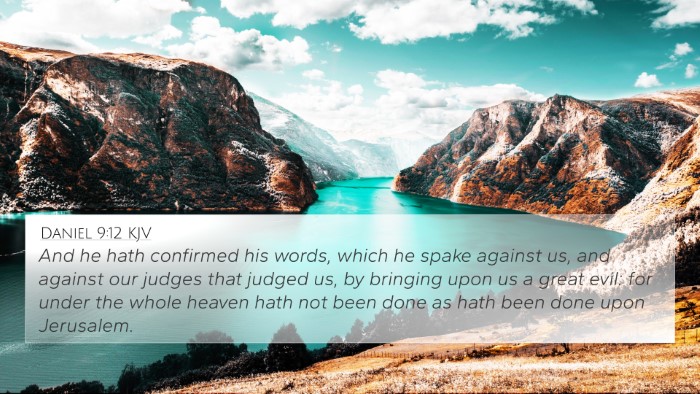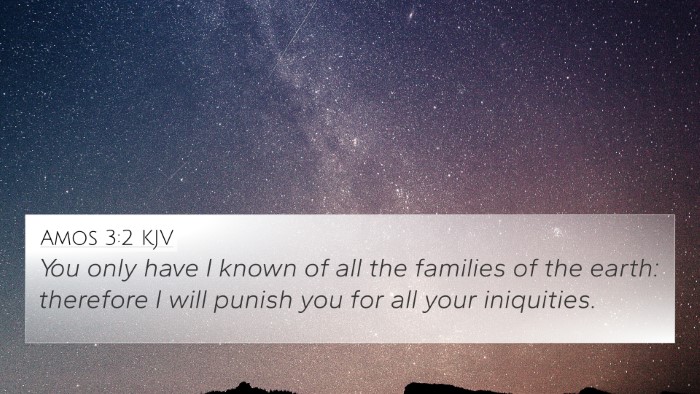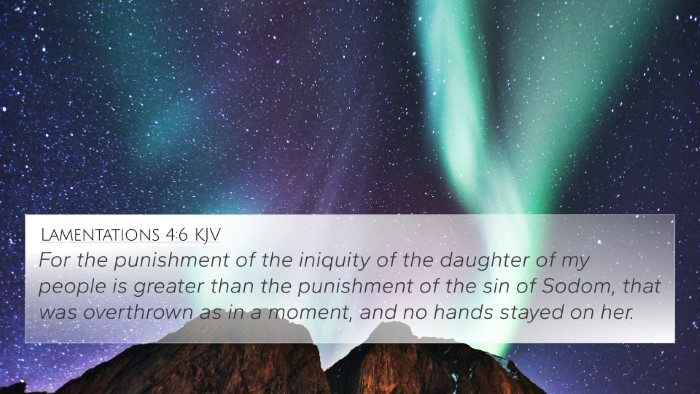Ezekiel 5:9 - Meaning and Interpretation
Verse: "And I will do in thee that which I have not done, and whereunto I will not do any more the like, because of all thine abominations." - Ezekiel 5:9 (KJV)
Summary of Meaning
The verse Ezekiel 5:9 delivers a profound message of judgment against Jerusalem due to its abominations. This declaration by God indicates that the severity of the impending judgment is unprecedented, signaling a gravely serious state of rebellion and sin among the people. God’s intention to execute a unique form of punishment reflects both His holiness and the seriousness of Israel's transgressions.
Commentary Insights
-
Matthew Henry:
Henry emphasizes the gravity of divine judgment and the uniqueness of God's response to the heinous sins of Israel. He notes that the statement of unparalleled punishment serves as a stark warning to both the ancient Israelites and to future readers about the consequences of forsaking God's ways.
-
Albert Barnes:
Barnes provides insight into the historical context of the verse, highlighting how the actions of the people brought about their downfall. He draws attention to the theme of God’s justice and righteousness, illustrating that while God is merciful, His judgment on sin is severe and exacting.
-
Adam Clarke:
Clarke analyzes the implications of God's unique punishment, suggesting it serves to demonstrate God's sovereignty over nations and His ability to execute justice on a grand scale. He notes the importance of understanding God's character through the lens of such severe judgments and the lessons they impart about sin and repentance.
Cross References
Ezekiel 5:9 connects with various other scriptures which elucidate God's judgment and the seriousness of sin. Here are some relevant Bible verse cross-references that provide deeper insight:
- Jeremiah 5:9: "Shall I not punish them for these things? saith the LORD: and shall not my soul be avenged on such a nation as this?" - Illustrates God's hunger for justice against wicked nations.
- Isaiah 66:4: "I also will choose their delusions, and will bring their fears upon them; because when I called, none did answer; when I spake, they did not hear: but they did evil before mine eyes, and chose that in which I delighted not." - Reflects God's response to idolatry and unfaithfulness.
- Amos 3:2: "You only have I known of all the families of the earth: therefore I will punish you for all your iniquities." - Indicates the special relationship God had with Israel and the accountability that comes with it.
- Micah 3:9: "Hear this, I pray you, ye heads of the house of Jacob, and princes of the house of Israel, that abhor judgment, and pervert all equity." - Communicates a warning to leaders regarding their corruption.
- Romans 1:18: "For the wrath of God is revealed from heaven against all ungodliness and unrighteousness of men, who hold the truth in unrighteousness;" - Connects the Old Testament understanding of God's judgment with New Testament theology.
- Hebrews 10:31: "It is a fearful thing to fall into the hands of the living God." - Emphasizes the seriousness of facing God's judgment and a call towards holiness and righteousness.
- Lamentations 3:38: "Out of the mouth of the most High proceedeth not evil and good?" - Reflects on God's sovereign power over good and evil as part of His judgment mechanism.
Thematic Connections
The themes present in Ezekiel 5:9 resonate throughout the Bible, providing a rich context for understanding God's interaction with humanity. The following are key themes that can be cross-referenced:
- Divine Judgment: The severe consequences of sin and turning away from God’s commandments.
- Repentance and Restoration: The opportunities for turning back to God and receiving mercy.
- God’s Sovereignty: His supreme authority over nations and peoples.
- Call to Holiness: The expectation that God's people live righteous lives in accordance with His will.
- Consequences of Idolatry: The disconnect between idolatrous practices and the character of God.
Conclusion
Ezekiel 5:9 serves as a striking reminder of God’s justice, sovereignty, and the severe consequences of persistent sin. The reflections from public domain commentaries provide valuable insights into the weight of this verse, encouraging readers to heed its warnings and understand the broader context of divine communication throughout the scriptures. Through careful cross-referencing and comparative analysis, one can appreciate the interconnectedness of Biblical themes that illustrate God’s nature and expectations for His people.
Further Study Tools
For those looking to delve deeper into cross-referencing Bibles and thematic studies, the following tools can be invaluable:
- Bible Concordance: A comprehensive listing of all the words in the Bible.
- Bible Cross-Reference Guide: A helpful tool to find parallels and related verses.
- Tools for Bible Cross-Referencing: Utilize various resources that aid in identifying connections.
- Bible Chain References: Explore connections in a serialized manner to see flow of themes.







